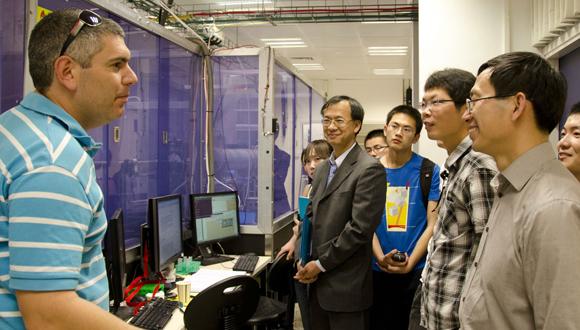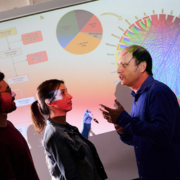TAU strengthens its ties with leading Chinese universities
Over 200 students and faculty members from China studied at Tel Aviv University in 2012.
Tel Aviv University is strengthening its ties with leading universities in China. Some 200 students and faculty members from China came to the University in 2012, and are enrolled in various programs.
Tel Aviv University president Prof. Yosef Klafter says that in the course of the past year, broad collaboration is being forged between the University and the elite Tsinghua University in China. Two large delegations from this university, which is considered to be one of the best in China in the field of science and technology, are currently taking part in a two-week visit to Tel Aviv University as part of a wider collaboration in a number of fields that is taking shape between the Chinese university, located in Beijing, and Tel Aviv University, placing it in the forefront of academic collaboration with China. It will be remembered that it was recently reported that Tsinghua University was given a donation of $100 million by the founder of the Blackstone Foundation, Stephen Schwartzman.
The visit by the current delegations follows two visits to China by the President of Tel Aviv University, Prof. Yosef Klafter, and the Vice President, Prof. Raanan Rein, in the second half of 2012. According to Prof. Klafter, the collaboration includes joint research, and exchange visits by researchers and students, the three main axes of cooperation being in the fields of nanotechnology and nano-mechanics, life sciences, and business administration.
Nanotechnology and life sciences
One of the delegations, which includes professors and senior researchers, doctoral students, and undergraduate students from the outstanding student program of the Chinese university, participated in a joint nanotechnology research workshop led by Prof. Michael Orbach of the Faculty of Exact Sciences. The workshop included a seminar, lectures, tours of laboratories, a meeting with Israeli colleagues, and preparations for the visit of additional Chinese students during the summer. Prof. Orbach himself has already spent time in China for a research period, and began collaborations with local researchers. He will be returning to China shortly for further research.
A second delegation from China is visiting the School of Life Sciences at Tel Aviv University this week. The delegation has met with the Dean of the Faculty of Life Sciences, Prof. Moshe Mevarech, and with the staff of the Department of Biochemistry. During the summer, Chinese students are expected to come for advanced study in the School of Life Sciences laboratories.
The delegations' visit is intended to prepare for the upcoming visits to Beijing by the University's President and Vice President, during which they will further upgrade the connection between the universities, and propose a new venture.
These visits follow the visit in April by a delegation of 45 people, headed by the Dean of the Faculty of Management at Tsinghua. Faculty members and senior managers, took part in a concentrated six-day study program held at the Recanati Faculty of Management, intended for managers from around the world looking to learn from the Israeli model of entrepreneurship and innovation.
In addition to these delegations, and as part of the broader measures that the University is taking to strengthen academic cooperation with China, a delegation will be arriving shortly from Hong Kong University for Science and Technology, the leading university in its field in Hong Kong; and a joint workshop is being held with researchers from Renmin University in China, who are coming together with their vice president in order to increase cooperation in the fields of social sciences and humanities.
"For some time now, China has no longer been the future," sums up Prof. Yosef Klafter, "China is the present. There is accelerated development of the Chinese university system, and the research institutes in particular, and we see that the research programs with which we are collaborating are headed by faculty members who have received their training at top universities in the United States and Europe. In light of the strategic decision by the University to strengthen its international presence in East Asia, China is obviously a preferred target for us. We are looking for the best institutions, and there is no doubt that Tsinghua is among the very finest of them."






